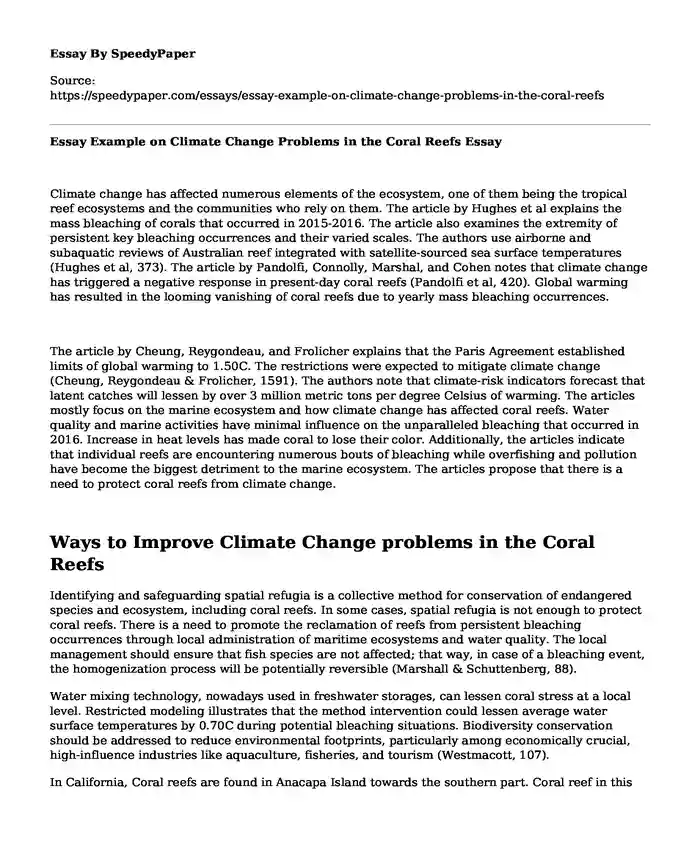
| Type of paper: | Essay |
| Categories: | Climate change |
| Pages: | 3 |
| Wordcount: | 653 words |
Climate change has affected numerous elements of the ecosystem, one of them being the tropical reef ecosystems and the communities who rely on them. The article by Hughes et al explains the mass bleaching of corals that occurred in 2015-2016. The article also examines the extremity of persistent key bleaching occurrences and their varied scales. The authors use airborne and subaquatic reviews of Australian reef integrated with satellite-sourced sea surface temperatures (Hughes et al, 373). The article by Pandolfi, Connolly, Marshal, and Cohen notes that climate change has triggered a negative response in present-day coral reefs (Pandolfi et al, 420). Global warming has resulted in the looming vanishing of coral reefs due to yearly mass bleaching occurrences.
The article by Cheung, Reygondeau, and Frolicher explains that the Paris Agreement established limits of global warming to 1.50C. The restrictions were expected to mitigate climate change (Cheung, Reygondeau & Frolicher, 1591). The authors note that climate-risk indicators forecast that latent catches will lessen by over 3 million metric tons per degree Celsius of warming. The articles mostly focus on the marine ecosystem and how climate change has affected coral reefs. Water quality and marine activities have minimal influence on the unparalleled bleaching that occurred in 2016. Increase in heat levels has made coral to lose their color. Additionally, the articles indicate that individual reefs are encountering numerous bouts of bleaching while overfishing and pollution have become the biggest detriment to the marine ecosystem. The articles propose that there is a need to protect coral reefs from climate change.
Ways to Improve Climate Change problems in the Coral Reefs
Identifying and safeguarding spatial refugia is a collective method for conservation of endangered species and ecosystem, including coral reefs. In some cases, spatial refugia is not enough to protect coral reefs. There is a need to promote the reclamation of reefs from persistent bleaching occurrences through local administration of maritime ecosystems and water quality. The local management should ensure that fish species are not affected; that way, in case of a bleaching event, the homogenization process will be potentially reversible (Marshall & Schuttenberg, 88).
Water mixing technology, nowadays used in freshwater storages, can lessen coral stress at a local level. Restricted modeling illustrates that the method intervention could lessen average water surface temperatures by 0.70C during potential bleaching situations. Biodiversity conservation should be addressed to reduce environmental footprints, particularly among economically crucial, high-influence industries like aquaculture, fisheries, and tourism (Westmacott, 107).
In California, Coral reefs are found in Anacapa Island towards the southern part. Coral reef in this region is actually a series of huge reefs separated by sand and covered with brittle stars. Prior to bleaching of coral reefs, the fish species among the coral habitats differed quite significantly. However, after coral bleaching, the variation of the fish communities has been almost entirely lost. If the specific species are lost, the important ecosystem functions are also lost. Damselfish and similar fish species are well-known coral cleaners, eliminating algae and seaweed so that corals can flourish and then recover after a bleaching occurrence (Narchi & Price, 205). However, fewer fish species means that the important roles in the ecosystem are not carried out and in the event of a storm, coral reefs will be less resilient.
Works Cited
Cheung, William WL, Gabriel Reygondeau, and Frolicher, Thomas L. "Large benefits to marine fisheries of meeting the 1.5 C global warming target." Science 354.6319 (2016): 1591-1594.
Hughes, Terry P., et al. "Global warming and recurrent mass bleaching of corals." Nature 543.7645 (2017): 373.
Marshall, Paul, and Schuttenberg, Heidi. A Reef Manager's Guide to Coral Bleaching. Townsville, Qld: Great Barrier Reef Marine Park Authority, 2004. Print.
Narchi, Nemer E, and Price, Lisa L. Ethnobiology of Corals and Coral Reefs. Cham: Springer, 2015. Print.
Pandolfi, John M., Connolly, Sean R., & Cohen, Anne L. "Projecting coral reef futures under global warming and ocean acidification." Science 333.6041 (2011): 418-422.
Westmacott, Susie. Management of Bleached and Severely Damaged Coral Reefs. Gland, Switzerland: IUCN--the World Conservation Union, 2000. Print.
Cite this page
Essay Example on Climate Change Problems in the Coral Reefs. (2022, Sep 09). Retrieved from https://speedypaper.net/essays/essay-example-on-climate-change-problems-in-the-coral-reefs
Request Removal
If you are the original author of this essay and no longer wish to have it published on the SpeedyPaper website, please click below to request its removal:
- Essay Example on Plato's Republic
- Speech Evaluation Essay Sample
- Religion Essay Sampe: A Visit to Hillsongs Worship Center
- The Functions of the INTERPOL, Free Essay for Students
- Marketing Essay Example: New Product Launch Plan
- Biblical Narratives and Modern Scientific History. Paper Example
- Free Essay Example. Thoughts on Overall experience
Popular categories




